At the 2004 Summer Olympics in Athens, Greece, three disciplines of gymnastics were contested: artistic gymnastics, rhythmic gymnastics and trampoline. The artistic gymnastics and trampoline events were held at the Olympic Indoor Hall and the rhythmic gymnastics events were held at the Galatsi Olympic Hall.
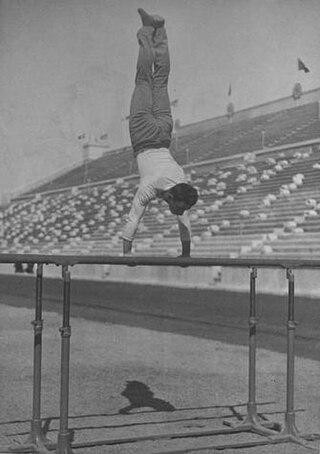
The men's parallel bars was one of eight gymnastics events on the Gymnastics at the 1896 Summer Olympics programme. The parallel bars event was held on 10 April, the seventh gymnastics event to be held. 18 gymnasts from six nations competed, with the judges announcing Alfred Flatow as the winner and Louis Zutter as the runner-up.

The men's vault was one of the eight gymnastics events on the Gymnastics at the 1896 Summer Olympics programme. The third event, it was held on 9 April. 15 athletes from five nations competed. The Germans captured the gold and bronze medals, while Zutter won the silver for Switzerland.

The men's pommel horse was one of eight gymnastics events on the Gymnastics at the 1896 Summer Olympics programme. The pommel horse was the fourth event held on 9 April. 15 athletes from five nations started the pommel horse exercise. Zutter won Switzerland's first gold medal in this event, with Weingärtner taking the silver.
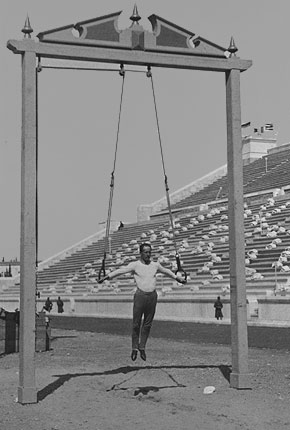
The men's rings was one of eight gymnastics events on the Gymnastics at the 1896 Summer Olympics programme. The fifth event, it was held on 9 April. There were eight competitors from three nations. The Greeks won the gold and bronze medals, with Hermann Weingärtner winning his fifth medal. Places 1–3 and 5 are known, but 4th place is not—any of the four athletes whose places are not known may have occupied the fourth position.

The men's team parallel bars was the first of eight gymnastics events on the Gymnastics at the 1896 Summer Olympics programme. It was held on 9 April. Three teams took part, one German and two Greek, with the German team winning the competition.

The men's team horizontal bar was the second of eight gymnastics events on the Gymnastics at the 1896 Summer Olympics programme. It was conducted on 9 April. Only one team, from Germany, competed.

The men's horizontal bar was a gymnastics event contested as part of the Gymnastics at the 1964 Summer Olympics programme at the Tokyo Metropolitan Gymnasium. The event was held on 18, 20, and 23 October. There were 128 competitors from 29 nations, with nations in the team competition having up to 6 gymnasts and other nations entering up to 3 gymnasts. The event was won by Boris Shakhlin of the Soviet Union, the nation's first victory in the horizontal bar after two Games with silver and bronze medals. The Soviets also took silver, with Yuri Titov finishing second. Shakhlin and Titov were the fifth and sixth men to win multiple medals in the horizontal bar. Bronze went to Miroslav Cerar of Yugoslavia.

The men's artistic individual all-around was an artistic gymnastics event held as part of the Gymnastics at the 1912 Summer Olympics programme. The competition was held on 12 July at the Stockholm Olympic Stadium. It was the fourth appearance of the event. There were 44 competitors from 9 nations. Each nation was limited to 6 gymnasts. The event was won by Alberto Braglia of Italy, the first man to successfully defend a title in the artistic individual all-around. The bronze medalist from 1908, Louis Ségura, this time took silver. Braglia and Ségura were the first two men to win multiple medals in the event. Italian Adolfo Tunesi earned bronze.

The men's individual all-around competition was one of eight events for male competitors in the artistic gymnastics discipline contested in the gymnastics at the 2004 Summer Olympics in Athens. The qualification and final rounds took place on August 14 and August 18 at the Olympic Indoor Hall. There were 98 competitors from 31 nations. Each nation could enter a team of 6 gymnasts or up to 2 individual gymnasts. The event was won by Paul Hamm of the United States, the nation's first victory in the men's all-around since the 1904 Games in St. Louis and second overall. It was the first medal of any color for an American in the men's all-around since the 1984 Games in Los Angeles. South Korea took two medals, a silver for Kim Dae-Eun and a bronze for Yang Tae Young. The scoring of the final was disputed; Olympedia calls this "the most controversial men's gymnastic event ever."

The men's horizontal bar competition was one of eight events for male competitors of the artistic gymnastics discipline contested in the gymnastics at the 2004 Summer Olympics in Athens. The qualification and final rounds took place on August 14 and August 23 at the Olympic Indoor Hall. There were 79 competitors from 29 nations, with nations competing in the team event having up to 5 gymnasts and other nations having up to 2 gymnasts. The event was won by Igor Cassina of Italy, the nation's first victory in the horizontal bar and first medal of any color in the event since 1928. Paul Hamm took silver, the United States' first horizontal bar medal since 1992. Bronze went to Isao Yoneda of Japan, the once-dominant nation's first medal in the event since 1984.

The men's parallel bars competition was one of eight events for male competitors of the artistic gymnastics discipline contested in the gymnastics at the 2004 Summer Olympics in Athens. The qualification and final rounds took place on August 14 and August 23 at the Olympic Indoor Hall. There were 81 competitors from 31 nations, with nations competing in the team event having up to 5 gymnasts and other nations having up to 2 gymnasts. The event was won by Valeriy Honcharov of Ukraine, the nation's second victory in the parallel bars. Hiroyuki Tomita took silver, putting Japan above the Soviet Union on the all-time medal table for the event. Li Xiaopeng of China became the seventh man to win multiple parallel bars medals with his bronze adding to his 2000 gold.

The men's horizontal bar competition at the 2008 Summer Olympics was held on 9 and 19 August at the Beijing National Indoor Stadium. The eight competitors with the highest scores in qualifying proceeded to the men's horizontal bar finals. There, each gymnast performed again; the scores from the final round determined final ranking. There were 76 competitors from 27 nations that competed on the horizontal bar, with nations in the team event entering up to 5 gymnasts while other nations could enter up to 2. The event was won by Zou Kai of China, the nation's first victory in the horizontal bar. Jonathan Horton won silver, the United States' second consecutive Games with a silver medalist in the horizontal bar. Germany's Fabian Hambüchen won the first of his three medals in the event with bronze.

The men's horizontal bar competition was one of eight events for male competitors in artistic gymnastics at the 1976 Summer Olympics in Montreal. The qualification and final rounds took place on July 18, 20, and 23rd at the Montreal Forum. There were 90 competitors from 20 nations, with nations competing in the team event having 6 gymnasts while other nations could have up to 3 gymnasts. The event was won by Mitsuo Tsukahara of Japan, the second man to successfully defend an Olympic title in the horizontal bar. It was the third consecutive victory by a Japanese gymnast in the event, and fifth in six Games. Japan also took silver, as Eizo Kenmotsu finished second, but was prevented from repeating its 1972 podium sweep by new rules that limited nations to two gymnasts in the final. Tsukuhara and Kenmotsu were the seventh and eighth men to win multiple medals in the horizontal bar. Henri Boerio of France and Eberhard Gienger of West Germany tied for bronze, the first medal for France in the event since 1924 and first horizontal bar medal for West Germany.

The men's horizontal bar competition was one of eight events for male competitors in artistic gymnastics at the 1960 Summer Olympics in Rome. It was held on 5, 7, and 10 September at the Baths of Caracalla. There were 130 competitors from 28 nations, with nations in the team competition having up to 6 gymnasts and other nations entering up to 2 gymnasts. The event was won by Takashi Ono of Japan, the nation's second consecutive victory in the men's parallel bars. Masao Takemoto gave Japan a second medal with his silver. Ono and Takemoto were the third and fourth men to win multiple medals in the parallel bars; Ono was the first to win two gold medals in the event. Boris Shakhlin of the Soviet Union took bronze.
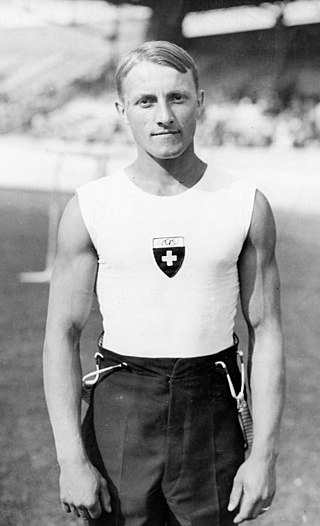
The men's horizontal bar event was part of the gymnastics programme at the 1928 Summer Olympics. It was one of seven gymnastics events for men and it was contested for the fourth time after 1896, 1904, and 1924. Scores from the horizontal bar event were added to the results from other individual apparatus events to give aggregate scores for the individual and team all-around events. There were 86 gymnasts from 11 nations, with each nation having a team of up to 8 gymnasts. The event was won by Georges Miez of Switzerland, the nation's first victory in the men's horizontal bar. The silver medal went to Romeo Neri of Italy, with Eugen Mack of Switzerland earning bronze.

The men's artistic individual all-around event was part of the gymnastics programme at the 1928 Summer Olympics. It was one of seven gymnastics events for men and was the seventh Olympic men's all-around gymnastic championship. Scores from the individual apparatus events were added to give aggregate scores for the individual all-around; individual all-around scores were similarly summed for the team all-around event. There were 88 competitors from 11 nations. Each nation sent a team of 8 gymnasts. The event was won by Georges Miez of Switzerland, with his countryman Hermann Hänggi taking silver. They were the first medals in the event for Swiss gymnasts since 1904 and the first gold medal ever for a Swiss man in the individual all-around. Defending Olympic champion Leon Štukelj of Yugoslavia finished with the bronze this time, making him the third man to win multiple medals in the event.

The men's horizontal bar competition at the 1948 Summer Olympics was held at Earls Court Exhibition Centre on 12 and 13 August. It was the seventh appearance of the event. There were 121 competitors from 16 nations, with each nation sending a team of up to 8 gymnasts. The event was won by Josef Stalder of Switzerland, with his countryman Walter Lehmann taking silver. It was the nation's second victory in the event, tying the United States for most all-time. Veikko Huhtanen of Finland earned bronze, giving Finland a three-Games podium streak in the event.
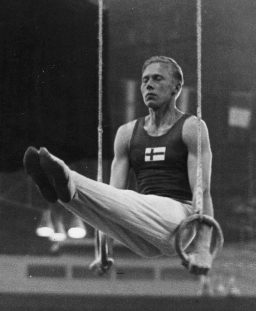
The men's parallel bars competition at the 1948 Summer Olympics was held at Earls Court Exhibition Centre on 12 and 13 August. It was the seventh appearance of the event. There were 122 competitors from 16 nations, with each nation sending a team of up to 8 gymnasts. The event was won by Michael Reusch of Switzerland, with his countrymen Christian Kipfer and Josef Stalder tying for bronze. Between the Swiss gymnasts was Veikko Huhtanen of Finland, taking silver. Reusch was the first man to win multiple medals in the event ; Stalder would become the second in 1952. It was Switzerland's second victory in the event, tying Germany for most gold medals.
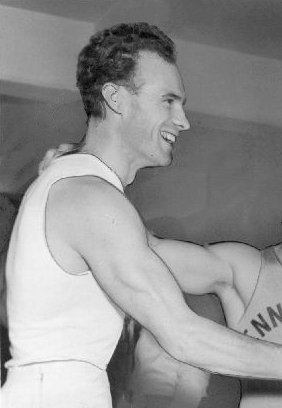
The men's horizontal bar competition at the 1952 Summer Olympics was held at Töölö Sports Hall, Exhibition Hall I from 19 to 21 July. It was the eighth appearance of the event. There were 185 competitors from 29 nations, with each nation sending up to 8 gymnasts. The event was won by Jack Günthard of Switzerland, the nation's second consecutive and third overall victory in the horizontal bar, breaking a tie with the United States for most all-time. Switzerland also took one of the silver medals, as Josef Stalder tied with Alfred Schwarzmann of Germany, competing at the age of 40, for second. Stalder and Schwarzmann were the first two men to win multiple horizontal bars medals; Stalder had won the event in 1948 and Schwarzmann had earned bronze in 1936.




















